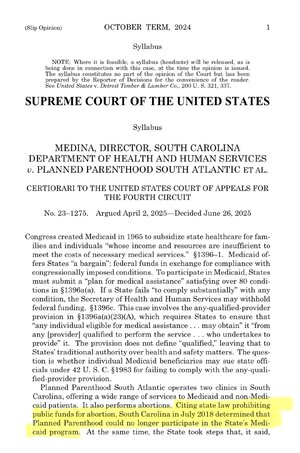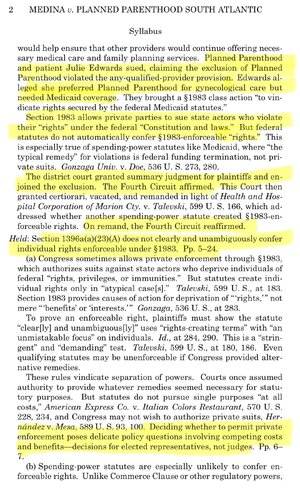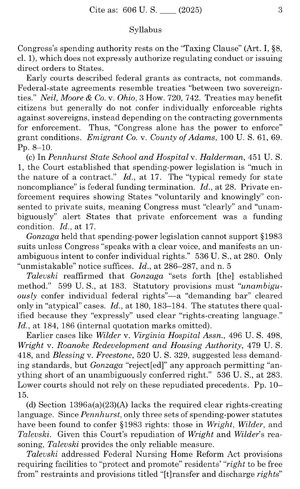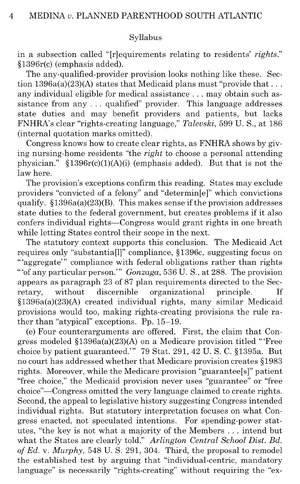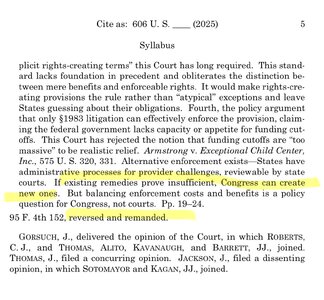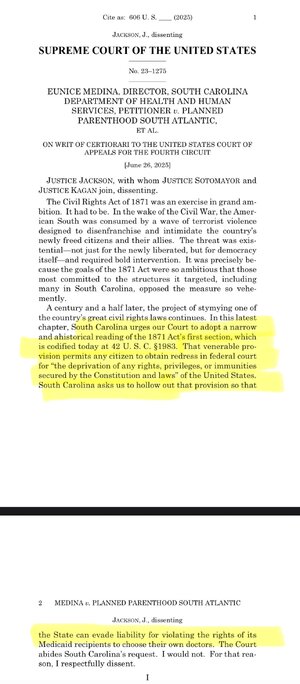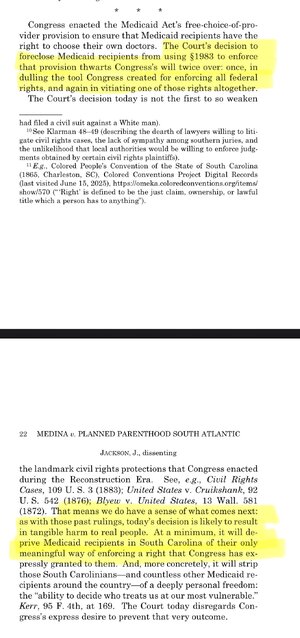Navigation
Install the app
How to install the app on iOS
Follow along with the video below to see how to install our site as a web app on your home screen.
Note: This feature may not be available in some browsers.
More options
You are using an out of date browser. It may not display this or other websites correctly.
You should upgrade or use an alternative browser.
You should upgrade or use an alternative browser.
SCOTUS Catch-all | 2024-25 Term Ends
- Thread starter nycfan
- Start date
- Replies: 486
- Views: 17K
- Politics
StrangePackage
Iconic Member
- Messages
- 1,605
I get the feeling that this is going to turn entirely on whether or not the religious views in question are Christian and conservative....
- Messages
- 22,506
Plaintiff is RastafarianI get the feeling that this is going to turn entirely on whether or not the religious views in question are Christian and conservative....
StrangePackage
Iconic Member
- Messages
- 1,605
No relief then.Plaintiff is Rastafarian
superrific
Legend of ZZL
- Messages
- 8,893
You sure? These prison cases usually involve rastafarians. Practically every one I've seen (at least from a pro bono perspective) involves that religion. I'm not sure the Supreme Court would be as put off by that as you're implying, though it would definitely help if it was a Catholic plaintiff.No relief then.
I mean, if you're planning a lawsuit, like the Colorado baker, go with a conservative Christian absolutely; it will improve your chances. I'm not sure the rastafarian is doomed for that reason alone.
- Messages
- 22,506
superrific
Legend of ZZL
- Messages
- 8,893
Wait, did the Supreme Court actually rule against Planned Parenthood? Who could have seen that coming?
superrific
Legend of ZZL
- Messages
- 8,893
So in the immigration case: Sotomayor leads with this in her dissent
Sometimes, to ask a question is to answer it. When petitioner Pierre Riley received an order from the Department of Homeland Security notifying him it would seek to deport him to Jamaica, he timely sought deferral of that removal on the ground that he would likely be killed upon his return there. After initially winning such relief from an Immigration Judge, Riley lost before the Board of Immigration Appeals. The question is when Riley should have petitioned for judicial review of the Board’s order. Was his petition due 30 days after the Government first notified him he would be deported, well over a year before the Board issued the order Riley sought to challenge? Or was it instead due30 days after the order denying his claim for deferral of removal? The answer is clear: One should not be required to appeal an order before it exists.
Later she continued: "Yet the majority today renders the statute incoherent, holding that Riley should have appealed the order one year and three months before the Board entered it. According to the majority, “statutory text and our prior precedents” require this absurd result. Ante, at 10. Our Nation’s immigration laws may be complex, but the irrational scheme the Court endorses today is a product entirely of its own creation."
All right, so sometimes dissents made outlandish claims about the majority's holding. Thus it is useful to see how the majority responds to the dissent's allegations. Surely Sotomayor's analysis was overheated. Surely the majority was not arguing that an order had to be appealed before it was issued.
So I looked. The majority did not respond. Its position seems to be that the alien who receives a removal order and doesn't want contest the removal order (because there's nothing to contest -- he was convicted of a felony that carries automatic deportation) must actually contest it in order to preserve any other issues that may come down the line. But the appeals court is not allowed to hear the case right away, because all of the claims supposedly have to be decided in the same hearing, so it has to wait until those proceedings are concluded.
So the majority says: an alien who receives a removal order that he does not contest must nonetheless waste everyone's time by appealing if he wants to preserve any Convention Against Torture claims. The appeals court must recognize that this is just a place holder, and put the appeal on its backburner until future proceedings are initiated and concluded (which might or might not even happen), at which point the panel must consider the case. What happens if one of the judges on the panel retires in the meantime -- the panel could be sitting on the claim for years? Who knows. Nobody knows. Nobody knows why Congress would do such a thing. In fact, nobody can point to Congress actually doing it, but we know it must have because of two opinions from decades ago that aren't on point.
Fuck these guys. This is what happens when you start hiring clerks because they were home-schooled as kids.
Sometimes, to ask a question is to answer it. When petitioner Pierre Riley received an order from the Department of Homeland Security notifying him it would seek to deport him to Jamaica, he timely sought deferral of that removal on the ground that he would likely be killed upon his return there. After initially winning such relief from an Immigration Judge, Riley lost before the Board of Immigration Appeals. The question is when Riley should have petitioned for judicial review of the Board’s order. Was his petition due 30 days after the Government first notified him he would be deported, well over a year before the Board issued the order Riley sought to challenge? Or was it instead due30 days after the order denying his claim for deferral of removal? The answer is clear: One should not be required to appeal an order before it exists.
Later she continued: "Yet the majority today renders the statute incoherent, holding that Riley should have appealed the order one year and three months before the Board entered it. According to the majority, “statutory text and our prior precedents” require this absurd result. Ante, at 10. Our Nation’s immigration laws may be complex, but the irrational scheme the Court endorses today is a product entirely of its own creation."
All right, so sometimes dissents made outlandish claims about the majority's holding. Thus it is useful to see how the majority responds to the dissent's allegations. Surely Sotomayor's analysis was overheated. Surely the majority was not arguing that an order had to be appealed before it was issued.
So I looked. The majority did not respond. Its position seems to be that the alien who receives a removal order and doesn't want contest the removal order (because there's nothing to contest -- he was convicted of a felony that carries automatic deportation) must actually contest it in order to preserve any other issues that may come down the line. But the appeals court is not allowed to hear the case right away, because all of the claims supposedly have to be decided in the same hearing, so it has to wait until those proceedings are concluded.
So the majority says: an alien who receives a removal order that he does not contest must nonetheless waste everyone's time by appealing if he wants to preserve any Convention Against Torture claims. The appeals court must recognize that this is just a place holder, and put the appeal on its backburner until future proceedings are initiated and concluded (which might or might not even happen), at which point the panel must consider the case. What happens if one of the judges on the panel retires in the meantime -- the panel could be sitting on the claim for years? Who knows. Nobody knows. Nobody knows why Congress would do such a thing. In fact, nobody can point to Congress actually doing it, but we know it must have because of two opinions from decades ago that aren't on point.
Fuck these guys. This is what happens when you start hiring clerks because they were home-schooled as kids.
Last edited:
superrific
Legend of ZZL
- Messages
- 8,893
superrific
Legend of ZZL
- Messages
- 8,893
Historically awful by what standards? I don't think the end of term this year is as bad as the last couple. Of course, by historical standards they are all awful.The end of the term these days is always so bad. And this is getting off to a historically awful start.
It's the stayed judgments that are the tipping point for me. I was thinking about it more. I think it's because the lower courts are using the major questions doctrine re: the Alien Enemies Act and other obscure provisions of the immigration code that the administration is trotting out. Supremes must have been like, "wait, that's OUR workaround!" and decided not to use any rules to decide cases, so they couldn't boomerang back.
From a judicial perspective, these stays are worse even than Dred Scott. Dred Scott was world-historically awful, but at least it was a decision. At least it laid down a rule of law. At least it was reasoned.
Share:

